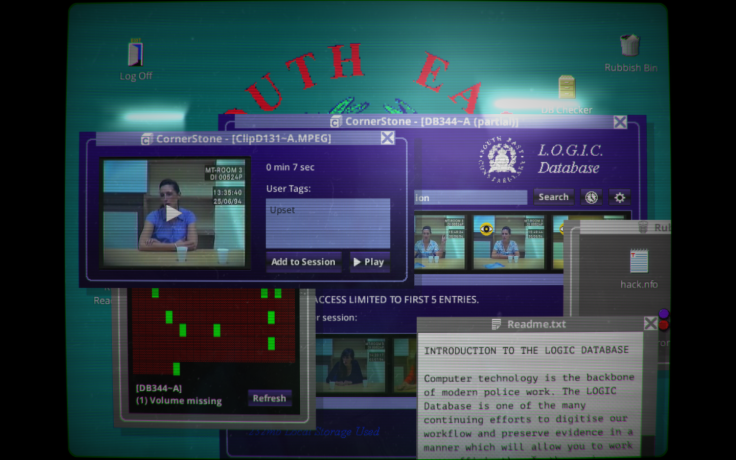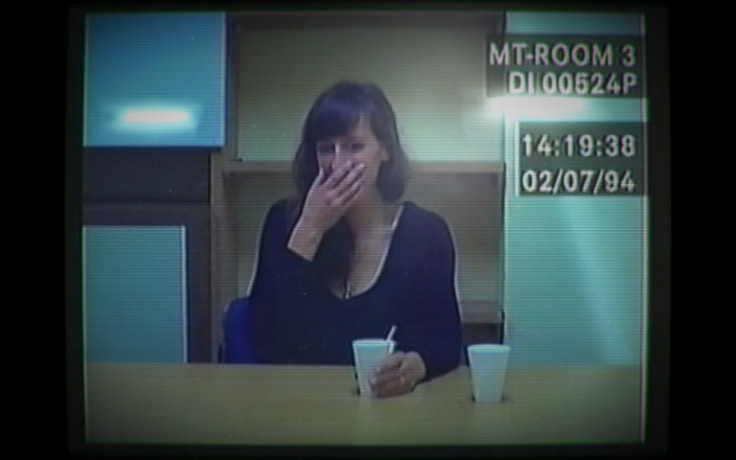Her Story interview: Sam Barlow on storytelling and 'not a game' claims

Her Story has earned near-universal critical acclaim for its unique approach to storytelling. It generated a huge buzz within the industry, despite being released the same week as much-hyped blockbuster behemoth Batman: Arkham Knight.
IBTimes UK caught up with its writer and director Sam Barlow to talk about the creation of Her Story, video game narratives in general, and the vocal minority who insist such games aren't real games.
IBTimes UK: I want to start off by talking about my play-through. At first it was very straightforward but the further I dug in, the more it became this tangled abstract story. By the end I knew what had occurred but it took me a while to really understand. Was this your intention all along?
Sam Barlow: I knew it wasn't going to be supernatural but would have a slight dreamlike surreal edge to it. The thing about thrillers in particular, if you watch a lot of them, they can end up in a fairly silly place. Even though the endings to Vertigo/Psycho are plain and fairly plausible. The art there is only having people able to see a little bit further ahead and get them so caught up in it that when they get to the silliness, it's absolutely convincing.
If you follow the breadcrumb trail of Vertigo for instance, it makes sense. This guy is planning to commit his murder and his plan relies on all these bits of chance and weirdness, if it hadn't gone exactly as it had in the movie, it would have fallen flat. For me what's interesting in games is you get involved even more. In Her Story, its creation is happening in your head, and I think the "silliness" is a useful thing because it ties in deeply with the themes of the story.
If you read Thomas Grippe's writings, he's very much interested in trying to create those mental challenges to force you to engage with the story and create the empty spaces that your brain can fill in. It's not something that games do often because they're more interested in a continuous 3D world. They make great theme parks but they're not for telling great stories. I think that so much storytelling is about the gaps, the omissions, the negative space. It's about the framing, the perspectives, the shifting of POVs. Too many games rely on dropping you into a seamless contiguous whole and being very reluctant to interfere with that.

Fairy tales are a theme running throughout Her Story and your previous game Silent Hill Shattered Memories, so I was trying to second guess your intentions in my play-through - was I close?
When I first started thinking about this project in my head, I pictured this as a game about uncovering the solution to the crime. Something that should be planned like a flow diagram, like a classic adventure game. But as I started developing it, I got some real life transcripts from a murder case, stuck them in a system like Her Story and played it myself. The case I was using was a kid who had murdered his parents and he'd done it for the inheritance.
When I played it, I found out that in this unscripted stuff I was uncovering layers within the story. Money was this layer that ran through it. If you searched for Money, you got all these different things. I was exposing this line just through this mechanism of searching against his language.
To me as a player, it felt exciting and it felt like a novel way to experience that story. At that point, I forced myself to give up that control and make the game work like that. I had confidence that there was enough in there that if you uncovered one thing there would be more to discover and you might want to get a rounder perspective on the bigger picture.
Her Story and Silent Hill: Shattered Memories balance the tension of player agency and directed narrative but in very different ways. Shattered Memories was a lot more directed while Her Story is a lot looser. Was this something you wanted to experiment with?
Shattered Memories is a perfect example of being a linear story in terms of the progression through the environments and the events of the plot. Everyone will have the same order even if you get lost on the way or dilly dally here or there.
What made it an interactive story, was that your second to second interaction with the game and some of the systems that were layered on top of that game were done to really make you feel that your personal approach to things was somehow mattering.
I was reminded of Silent Hill 2, where you can affect the outcome without realising it. In games you're usually given a binary and obvious moral choice or 'Press X to pay respects'.
My favourite moment in Silent Hill 2 was towards the end when you ran down the hotel corridor and you hear this argument with your wife that lasts 30 seconds while the corridor is only 10 seconds long. So either just exit because you don't give a s**t about this conversation or you listen to it all and it changes your perspective. I love stuff like that.
There's two things in Shattered Memories that aren't done enough in games: one is observing the player when they don't realise they're being observed; the other thing is that the consequence of the player's actions are not overt. They're not done in such a way as to reward the player. Even in the archetypal RPG choice system, do you kill or save the peasant? If you kill him, the game will reward you for that even if the knight says 'you murdering bastard'.
That in it's own way is rewarding you because you're playing as a mean dude and we think you're really mean, boo! And if you play as the good guy you'll get 'thank you, thank you, you're so pure and wonderful!' I just find that very uninteresting giving the player a world to role play and act out in and have that world just pander to that and make your day lovely.
Even though the choices in Telltale's games like The Walking Dead are binary, they aren't so clear cut morally and their games are all about seeing how those choices play out. Was that an influence on Her Story?
When you play a Telltale game, any given episode there's 5 or 10 choices then when the season's done and you reverse engineer it, there's only 3 or 4 that actually make a massive difference to it. The thing that companies like Inkle and Choice of Games are really big on is the idea of overwhelming the player with complexity so they don't even try and reverse engineer it. What they do through pure brute force is give you setups where there's so many options, and they make it annoying to replay that you just have to go with it.
There's just tons of choices, the consequences are delayed until much later in the game and they're the result of 10s of decisions you made earlier. That complexity creates a more interesting, layered personalised story. But again it stops you as a player from thinking too hard. Her Story has that kind of freedom to encourage people to be more playful. It gives them this sense of freedom and playfulness to it that there wouldn't be if it was so harshly scripted.

As much as I enjoy Telltale's work, it feels to me more like well written television. They don't leave me with the impression that they needed to be games. When I played Her Story, it felt directed but also very personal to me.
It's very much the density of interaction you have and with Her Story, it's about making your brain so much work because you're having figure out the context of the clip. What was the question the detectives asked to get this answer? It's placing it in the timeline of the interviews. It's working out the subtext of what's said to find out what is actually being said. Then it's putting that into the bigger picture of what the f**k is going on. And then it's also reacting to the themes and the symbols and imagery that are coming up. Reacting emotionally to what's there. There's so much for your brain to do outside of each clip.
The reaction to Her Story has been very divisive. There's some who claim its part of the 'social justice warrior' agenda for example, but what are your thoughts on the response it's had?
I've been floored to be honest. I expected that I'd put it out there and a small number of people who maybe liked my other games or were into interesting experimental kind of things would get it and like it.
One of the most tedious criticisms we hear now is "it's not a game!"
It's one of those things that's kind of annoying because I don't mind this being seen as a non-gamey game. I wouldn't mind it being seen as this huge feminist agenda. That to me isn't a bad thing. But this game doesn't really have that and mechanically what this game does is so much more involved with the density of interactions versus a big AAA game where you're led down a corridor and you're finding audio diaries and cut scenes or whatever, and your agency is the shooting galleries that are presented to you.
For me, what you're doing here has a much greater level of personal involvement and kind of challenge. It requires you to be deeply involved in it for the game to work. So for me it's a very interactive game. Clearly it doesn't use traditional game mechanics, clearly this is not a game where you explore a 3D space and accumulate a score and progress. It's not that game. That's one of the nicest things about the reviews and stuff. People have really bought into that. "Yes this does not play like X, Y and Z and does things very different to what you'd expect." But at the end of it, it's very involving as a player. This is something that does require your participation.
Her Story is available now on PC and iOS.
For all the latest video game news follow us on Twitter @IBTGamesUK.
© Copyright IBTimes 2024. All rights reserved.






















